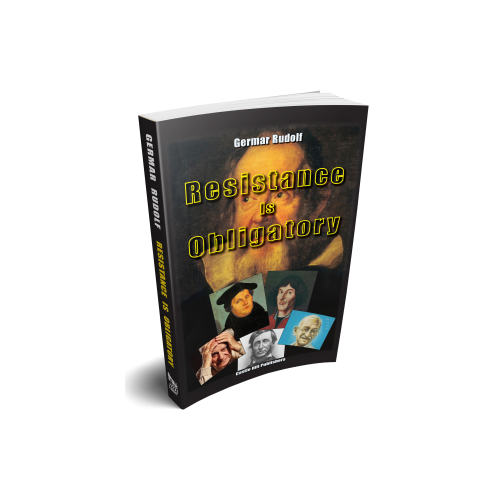Germar Rudolf: Resistance Is Obligatory – Address to the Mannheim District Court, 15 November 2006 to 29 January 2007
2nd slightly revised edition, Uckfield: Castle Hill Publishers, 2016
Language: English
Beschreibung
Here’s the long-awaited, uncensored inside story from the “thought criminal” himself—Germar Rudolf. Rudolf was a highly respected chemist with a promising career—a graduate of the Max Planck Institute—who made the “mistake” of telling the truth at a place (Germany) and time (during court) when lies are the only permissible public statements about the Holocaust. When informed he would be sent to prison for his factual testimony made during a law case involving the Holocaust, Rudolf went underground. He ended up in America, fell in love and was wed to his U.S. citizen sweetheart.
However, in late 2005, Rudolf—now a peace activist and publisher—was kidnapped by the U.S. government and deported to Germany to face charges of “Holocaust denial.” There he was put on trial for his historical writings. During this trial his defense lawyers were prohibited under the threat of prosecution from filing motions in support of Rudolf’s historical views. All motions filed by Rudolf’s defense team directed at proving that his writings are scientific in nature and are therefore protected by the German constitution were rejected by the court. Academics willing to confirm as expert witnesses the scholarly nature of Rudolf’s writings were barred from testifying.
Confronted with this kafkaesque situation, yet undaunted, Rudolf gave a brilliant speech in court that lasted seven sessions. In it he elucidated what science is and how to recognize its exemplars. He proved that his writings undoubtedly qualified. He demonstrated moreover why the German laws designed to suppress peaceful dissidents are unconstitutional and in violation of human rights. Furthermore he explained in detail why it is everyone’s obligation to resist in a non-violent way a state which throws peaceful dissidents into dungeons.
The court was hardly moved by Rudolf’s arguments. It sentenced him to 30 months imprisonment and ordered Rudolf’s opus magnum, the German edition of his Lectures on the Holocaust, to be confiscated and burned under police supervision. In addition, the public prosecutor initiated another criminal investigation against Rudolf, because he had tried to publish his defense speech from his prison cell.
After Rudolf had served his full prison term, he was released from prison in the summer of 2009 but also put under a three-years lasting “conduct supervision” by the German authorities. After this restriction was rescinded in the summer of 2011 due to his emigration to the U.S., his defense speech in support of liberty finally saw the light of day. The book also contains, among other things, a comprehensive documentation of the motions rejected by the court as well as two expert reports of historians who could not testify. Additionally, it is illustrated with a number of gorgeous drawings prepared by Rudolf during his time in prison (in this print edition reproduced in black&white).
Hardly two years later, however, the German censorship authorities banned the German edition of this book because it demands freedom of speech for historical dissidents… Read it all in this new edition of 2016.
50% of the turnover from sales of this book will be paid to the author as our (and your) contribution to remedy to some degree the injustice done to him! (Instead of the usual 10%.)
Read the review by John Tiffany
386 pages, paperback, illustrated
Kommentare
Der Schelm läßt übrigens die schwachmatischen "Kommentare" neurotisierter Antifanten zu seinen Büchern bewußt stehen, um klarzumachen, wes Geistes Kind diese bedauernswerten Kretins sind. Der Schelm ist allerdings Humanist und Optimist und daher voll davon überzeugt, daß sich der mentale Zustand der Linksdrifter mit der Zeit verbessern wird.
Ähnliche Produkte
Carlo Mattogno: Bungled: "Denying History" – How Michael Shermer and Alex Grobman Botched Their Attempt to Refute Those Who Say the Holocaust Never Happened
Carlo Mattogno, Germar Rudolf: Auschwitz Lies – Legends, Lies, and Prejudices on the Holocaust
Franco Deana, Carlo Mattogno: The Cremation Furnaces of Auschwitz, Part 3 – A Technical and Historical Study. Part 3: Photographs





